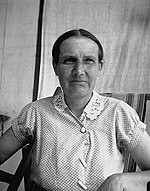Elisheva Bikhovski, Date of Birth, Place of Birth, Date of Death
TweetElisheva Bikhovski
Russian writer (1888-1949)About Elisheva Bikhovski
- Elisheva Bikhovski (Russian: ??????? ????????) (born Elizaveta Ivanovna Zhirkov (Russian: ????????? ???????? ??????); September 20, 1888 – March 27, 1949) — was a Russian-Israeli poet, writer, literary critic and translator, often known simply by her adopted Biblical Hebrew name Elishéva (Hebrew: ????????????).
- Her Russian Orthodox father, Ivan Zhirkov, was a village teacher who later became a bookseller and textbook publisher; her mother was descended from Irish Catholics who had settled in Russia after the Napoleonic Wars (1803–1815).
- Elisheva wrote most of her works in Hebrew, and also translated English and Hebrew poetry into Russian. On the death of her mother in 1891, she moved to Moscow with her aunt, an older sister of her mother, where she lived surrounded by the English language and culture.
- Though not culturally Jewish, she became the classmate of Jewish girls who introduced her to their culture and traditions, and she began to write poetry in 1907.
- Not at first differentiating between Hebrew and Yiddish as the “language of the Jews,” she began studying Yiddish — which, she wrote, because of its kinship to other European languages, especially German, she found easy to understand.
- She learned the Hebrew alphabet from a Hebrew grammar book owned by her brother, the philologist and Esperantist Lev Zhirkov (1885–1963), a specialist in Persian and Caucasian languages.
- She studied both Russian and English literature, graduating from a grammar school for girls and in 1910 becoming certified as a teacher at a progressive school of Stanislaus Shatsky's and Alexander Zelenko's Children's Work and Play Society through courses that trained preschool and elementary teachers according to the system of the innovative German educator Friedrich Fröbel (1782–1852).
Read more at Wikipedia
See Also
- Famous People's Birthdays on 20 September, Russia
- Famous People's Birthdays in September, Russia
- Famous People's Birthdays on 20 September, Israel
- Famous People's Birthdays in September, Israel
- Famous writer's Birthdays on 20 September, Russia
- Famous writer's Birthdays in September, Russia
- Famous poet's Birthdays on 20 September, Russia
- Famous poet's Birthdays in September, Russia
- Famous translator's Birthdays on 20 September, Russia
- Famous translator's Birthdays in September, Russia
- Famous literary critic's Birthdays on 20 September, Russia
- Famous literary critic's Birthdays in September, Russia
- Famous writer's Birthdays on 20 September, Israel
- Famous writer's Birthdays in September, Israel
- Famous poet's Birthdays on 20 September, Israel
- Famous poet's Birthdays in September, Israel
- Famous translator's Birthdays on 20 September, Israel
- Famous translator's Birthdays in September, Israel


 Date of Birth:
Date of Birth:  Place of Birth: Spassk-Ryazansky, Russia
Place of Birth: Spassk-Ryazansky, Russia